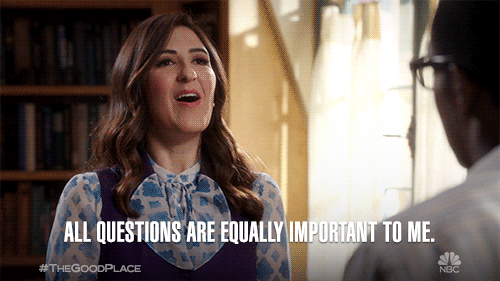Spring registration season is upon us.
Students are preparing to declare majors, apply to graduate programs and jobs, and picking next semester’s classes — all while the uncertainty of the next semester looms ahead.
As an academic advisor, I have felt this uncertainty from students who are experiencing financial and personal crises impacting their career and academic decisions
So, how can academic and career advisors direct students toward success in the midst of a pandemic?
Here are eight questions I recommend asking students this registration season.

1. What kind of career are you interested in after graduation?
- Although some students may seem set on a career path, an estimated 20-50% of undergraduate students at four-year institutions haven’t yet declared a major, and around 75% of students change their majors at least once before graduation.
- Many academic programs build up students’ skills for multiple career paths and many careers are pursued by applicants who have studied a variety of fields. According to the U.S. Bureau of Labor Statistics, the average number of career changes in a lifetime is 12, with Americans changing employers around every 2.5 years.
2. What other interests do you have?
- I love asking this question! It often reveals not only why a student is majoring in a field but who inspired them, how the subject has influenced them, and what their long-term goals are.
- Asking about interests can guide conversations should a student be seeking to add on a second major, pursue an alternative major, or add a minor.
- Hobbies, whether career-related or not, can make for a great “interests” section on students’ resumes! A co-curricular transcript can demonstrate to future employers that their experiences have helped them bridge the gap between campus life and workforce readiness.
3. How do you plan on working towards these goals?
- Today’s employers are looking for more than just a certain degree on applicants’ resumes; they’re also interested in candidates’ skills, experiences, on-the-job results, and much more.
- It is crucial to get students thinking beyond just passing their classes; they also need to focus on gaining valuable non-classroom experiences during their studies.
- This question can open up conversations related to volunteering, internships, work experiences, research projects, student org involvement, and much more — all factors that can help students enter a career they’ll be passionate about after graduation.
4. What responsibilities are you juggling outside of academics?
- As the number of adult learners and student-caregivers pursuing college degrees increases, it is imperative for you to discuss with your students the commitments they have outside of classes.
- This can lead to conversations about study skills, time management, campus resources, and self-advocacy skills within the classroom.
5. Are you considering pursuing further education or other competitive programs?
- Preparing early is key for graduate programs with prerequisites. Some programs even have early application and enrollment deadlines. They might also require students to take comprehensive exams and submit other materials that take a while to gather.
- This can open the door to conversations about preparing applications, sourcing letters of recommendation, and studying for exams.
- Creating a backup plan with their academic advisor may also provide the student with some peace of mind should their primary plan not work on their first try.
6. What types of academic support do you need to succeed?
- There are so many support services available to students that they may not be aware of! This is especially true for first-generation students who may not have the cultural capital advantages to help them to navigate campus life.
- You should be ready to provide students with information on career counseling, information technology, scholarships, the local or campus food pantry, mental health counseling, professional associations, and other support services.
7. How have you begun to prepare career-related resources for yourself?
- This question can help the student bridge the gap between college life and their post-graduation career.
- It may also help them think critically about the opportunities they have available to them while at your institution.
- Students who are eager to prepare for their career search can begin to work with career counselors on improving their LinkedIn profiles, resumes, interview skills, and so much more, rather than attempting to wing it after graduation.
8. What relationships and experiences are you hoping to gain from your college experience?
- There is so much to be gained from a student’s undergraduate experience that they may not know where to start.
- This is another question that can open up the floor for you to talk about the student’s work experience, volunteering, research, and other activities that may help them find employment after graduation.
- However, there is so much more to college than preparing for a job. Help your students think critically about what they would like to gain from their college experience. Lifelong friends, mentors, and a well-rounded perspective are all common answers and often what we hope to cultivate through our work in student affairs!
These eight questions are some of my favorites, but academic and career advisors shouldn’t be limited in how they can discuss students’ goals.

What questions do you love asking students in your academic or career advising sessions? Connect with us on Twitter @themoderncampus.
For more tips on addressing students’ current and future careers in a positive and growth-minded manner, check out 3 Ways to Empower Students in Their Career Paths Despite the Uncertain Future.





